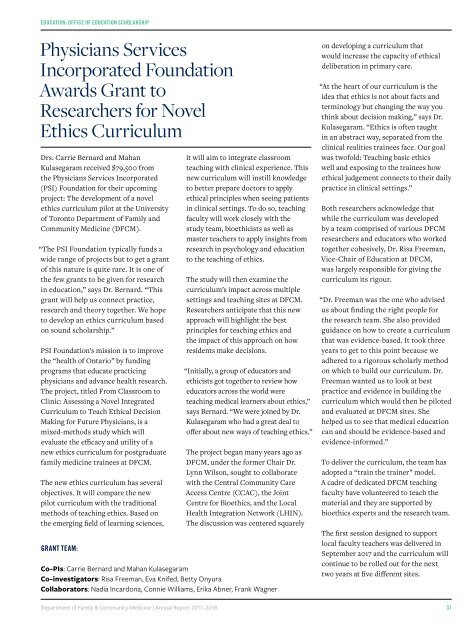DFCM Annual Report 2017-2018
You also want an ePaper? Increase the reach of your titles
YUMPU automatically turns print PDFs into web optimized ePapers that Google loves.
EDUCATION: OFFICE OF EDUCATION SCHOLARSHIP<br />
Physicians Services<br />
Incorporated Foundation<br />
Awards Grant to<br />
Researchers for Novel<br />
Ethics Curriculum<br />
Drs. Carrie Bernard and Mahan<br />
Kulasegaram received $79,500 from<br />
the Physicians Services Incorporated<br />
(PSI) Foundation for their upcoming<br />
project: The development of a novel<br />
ethics curriculum pilot at the University<br />
of Toronto Department of Family and<br />
Community Medicine (<strong>DFCM</strong>).<br />
“The PSI Foundation typically funds a<br />
wide range of projects but to get a grant<br />
of this nature is quite rare. It is one of<br />
the few grants to be given for research<br />
in education,” says Dr. Bernard. “This<br />
grant will help us connect practice,<br />
research and theory together. We hope<br />
to develop an ethics curriculum based<br />
on sound scholarship.”<br />
PSI Foundation’s mission is to improve<br />
the “health of Ontario” by funding<br />
programs that educate practicing<br />
physicians and advance health research.<br />
The project, titled From Classroom to<br />
Clinic: Assessing a Novel Integrated<br />
Curriculum to Teach Ethical Decision<br />
Making for Future Physicians, is a<br />
mixed-methods study which will<br />
evaluate the efficacy and utility of a<br />
new ethics curriculum for postgraduate<br />
family medicine trainees at <strong>DFCM</strong>.<br />
The new ethics curriculum has several<br />
objectives. It will compare the new<br />
pilot curriculum with the traditional<br />
methods of teaching ethics. Based on<br />
the emerging field of learning sciences,<br />
GRANT TEAM:<br />
it will aim to integrate classroom<br />
teaching with clinical experience. This<br />
new curriculum will instill knowledge<br />
to better prepare doctors to apply<br />
ethical principles when seeing patients<br />
in clinical settings. To do so, teaching<br />
faculty will work closely with the<br />
study team, bioethicists as well as<br />
master teachers to apply insights from<br />
research in psychology and education<br />
to the teaching of ethics.<br />
The study will then examine the<br />
curriculum’s impact across multiple<br />
settings and teaching sites at <strong>DFCM</strong>.<br />
Researchers anticipate that this new<br />
approach will highlight the best<br />
principles for teaching ethics and<br />
the impact of this approach on how<br />
residents make decisions.<br />
“Initially, a group of educators and<br />
ethicists got together to review how<br />
educators across the world were<br />
teaching medical learners about ethics,”<br />
says Bernard. “We were joined by Dr.<br />
Kulasegaram who had a great deal to<br />
offer about new ways of teaching ethics.”<br />
The project began many years ago as<br />
<strong>DFCM</strong>, under the former Chair Dr.<br />
Lynn Wilson, sought to collaborate<br />
with the Central Community Care<br />
Access Centre (CCAC), the Joint<br />
Centre for Bioethics, and the Local<br />
Health Integration Network (LHIN).<br />
The discussion was centered squarely<br />
Co-PIs: Carrie Bernard and Mahan Kulasegaram<br />
Co-investigators: Risa Freeman, Eva Knifed, Betty Onyura<br />
Collaborators: Nadia Incardona, Connie Williams, Erika Abner, Frank Wagner<br />
on developing a curriculum that<br />
would increase the capacity of ethical<br />
deliberation in primary care.<br />
“At the heart of our curriculum is the<br />
idea that ethics is not about facts and<br />
terminology but changing the way you<br />
think about decision making,” says Dr.<br />
Kulasegaram. “Ethics is often taught<br />
in an abstract way, separated from the<br />
clinical realities trainees face. Our goal<br />
was twofold: Teaching basic ethics<br />
well and exposing to the trainees how<br />
ethical judgement connects to their daily<br />
practice in clinical settings.”<br />
Both researchers acknowledge that<br />
while the curriculum was developed<br />
by a team comprised of various <strong>DFCM</strong><br />
researchers and educators who worked<br />
together cohesively, Dr. Risa Freeman,<br />
Vice-Chair of Education at <strong>DFCM</strong>,<br />
was largely responsible for giving the<br />
curriculum its rigour.<br />
“Dr. Freeman was the one who advised<br />
us about finding the right people for<br />
the research team. She also provided<br />
guidance on how to create a curriculum<br />
that was evidence-based. It took three<br />
years to get to this point because we<br />
adhered to a rigorous scholarly method<br />
on which to build our curriculum. Dr.<br />
Freeman wanted us to look at best<br />
practice and evidence in building the<br />
curriculum which would then be piloted<br />
and evaluated at <strong>DFCM</strong> sites. She<br />
helped us to see that medical education<br />
can and should be evidence-based and<br />
evidence-informed.”<br />
To deliver the curriculum, the team has<br />
adopted a “train the trainer” model.<br />
A cadre of dedicated <strong>DFCM</strong> teaching<br />
faculty have volunteered to teach the<br />
material and they are supported by<br />
bioethics experts and the research team.<br />
The first session designed to support<br />
local faculty teachers was delivered in<br />
September <strong>2017</strong> and the curriculum will<br />
continue to be rolled out for the next<br />
two years at five different sites.<br />
Department of Family & Community Medicine | <strong>Annual</strong> <strong>Report</strong> <strong>2017</strong>–<strong>2018</strong> 31


